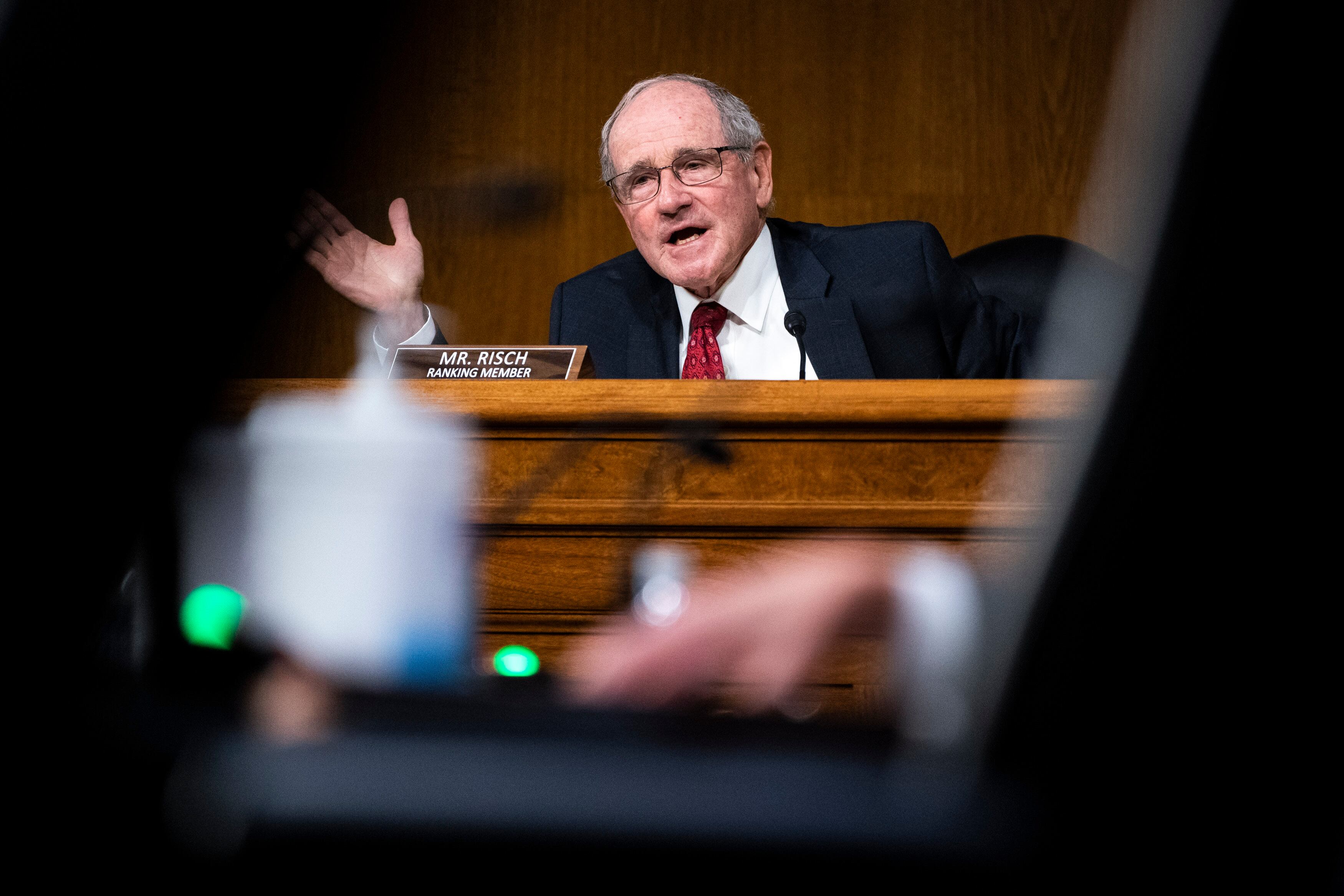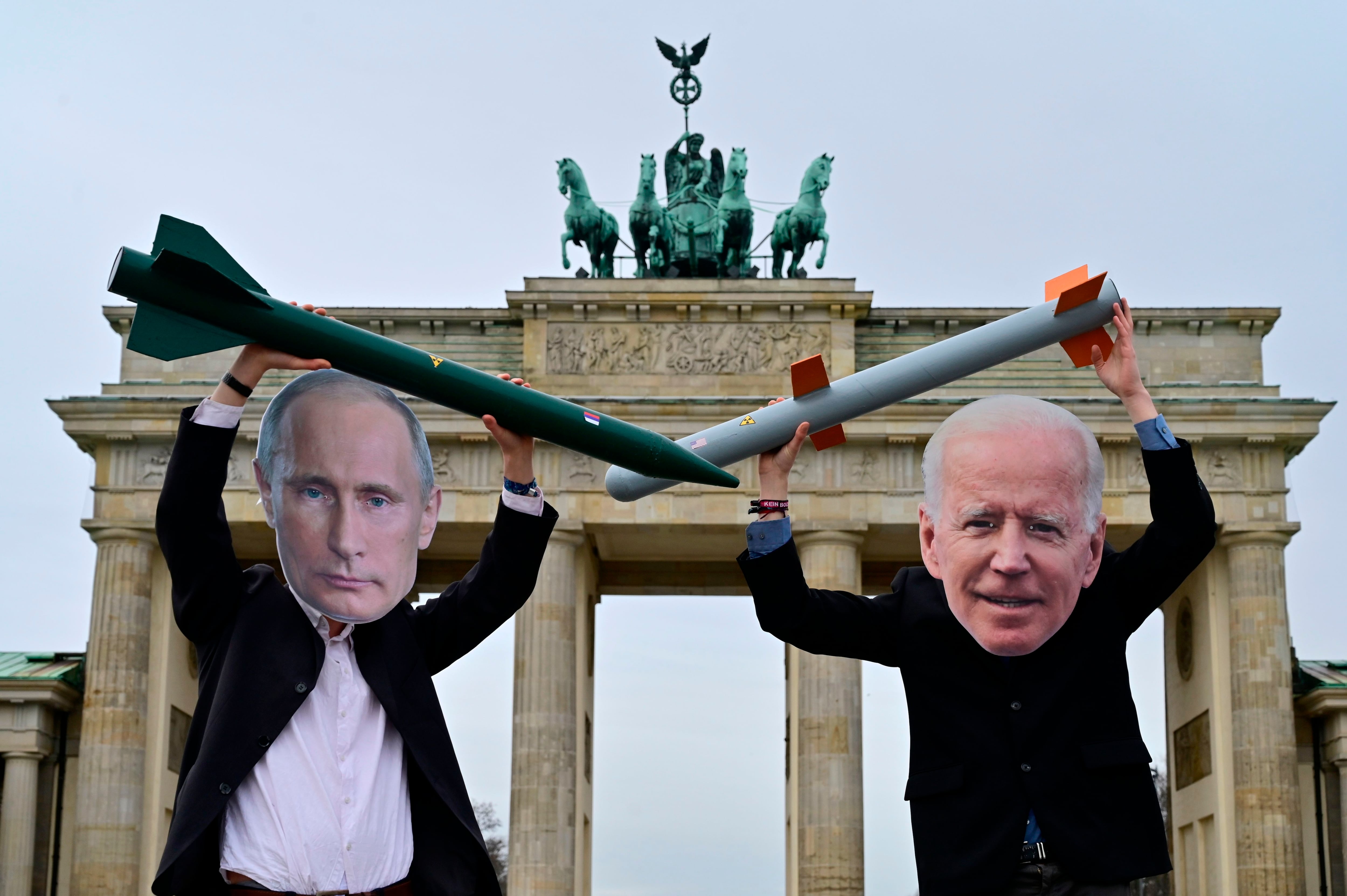WASHINGTON ― Five years after President Barack Obama turned back from declaring a “no first use” as U.S. policy for nuclear weapons, opponents say the Biden administration is considering it too, and warn that it risks alienating allies.
The Senate Foreign Relations Committee’s ranking member, Sen. Jim Risch, R-Idaho, said that he believes America’s allies are “very, very upset” with the idea President Joe Biden might reverse decades of U.S. nuclear policy as part of his administration’s sweeping Nuclear Posture Review, expected in 2022. The U.S. has historically maintained ambiguity about whether it would carry out a first strike with a nuclear weapon, but the policy would expressly rule it out.
“It gives more comfort to the enemy that they can plan an attack and do whatever they want to and not worry about us using a first strike,” Risch said of a “no first use” policy. “Nobody wants to use a first strike, but there are scenarios where you can imagine a first strike, and the best thing you can do is keep [adversaries] off balance.”
Risch said Tuesday that he is opposing confirmation of Biden’s nominee for assistant secretary of state for arms control, verification and compliance, Mallory Stewart, in connection with the matter. That complicates but doesn’t necessarily sink confirmation for Stewart, who serves as the arms control lead for the National Security Council.
Proponents of “no first use” argue it reduces the chances that China or Russia, mistakenly fearing a U.S. nuclear attack, would launch their own first strike. However, allied leaders in Europe and Asia are likely to see it as an erosion of America’s guarantee to protect them, and it would put the U.S. at odds with the strategic-ambiguity policies of NATO and nuclear-armed U.K. and France.
NATO allies, along with Japan and South Korea, have likely been speaking out against the possibility of a “no first use” policy, either to visiting U.S. lawmakers, or through their embassies in the U.S., said William Alberque, the former director of NATO’s Arms Control, Disarmament, and WMD Non-Proliferation Centre.
Declaring that nuclear weapons are only to answer nuclear weapons would worry Asian allies fearful of China and North Korea, pushing South Korea toward fielding its own nuclear arms, Alberque said. In Europe, it would signal to Russia that it can invade its neighbors without fear of a nuclear response ― and gain Washington nothing in planned arms control talks with Moscow.
“If the United States comes in and says, ‘If Russia invades NATO, we promise not to use nuclear weapons unless you nuke us,’ I think, after the Russians pull themselves off the floor from laughing hysterically, they’re going to say, ‘Wait, are you serious,’” Alberque said. “What kind of goodwill gesture is that when Russia has short-range nukes all along its border?”
Some within the administration are said to be arguing the Pentagon-led Nuclear Posture Review should take an unorthodox step and seek foreign input from across the political spectrum. The thinking is there are diverse views within allied countries when it comes to nuclear weapons policy.
“With the NPR, the question is how broad the representation will be from our allies,” said Jeffrey Lewis, a nuclear arms control expert and professor at the Middlebury Institute of International Studies. “The conservatives and the Pentagon want to talk to the same small group of people they always talk to, who tell them what they want to hear. And the people in the Biden administration who want to take a fresh look [at nuclear arms policy] want to talk to a broader range.”
On Tuesday, Risch grilled Stewart at her nomination hearing before the Senate Foreign Relations Committee, pressing her to agree with him that allies would strongly object to potential policy change. But Stewart said it would be hard to concede that allies are objecting to the results of the Nuclear Posture Review while it was ongoing ― and that the administration was still engaging with allies to address their concerns.
“I’m not sure if I understand the term ‘strenuous objection.’ I think they’re concerned,” Stewart told Risch, adding: “I don’t even know if it’s an ‘objection.’ The point is perhaps through our engagement, we hope to explain and understand, and really hear from them further.”
Risch was frustrated, saying: “If we on the Republican side of the committee have an understanding that our allies have strong, strong objections to what you’re considering, how is it that you can’t concede that?”

Asked by Sen. Ted Cruz, R-Texas, if she personally believes in a “no first use” policy, Stewart deferred to the ongoing review and said the country has to reduce the role of nuclear weapons in a way that “extended-deterrence commitments to our allies remain strong and credible.”
“It’s important to make sure our allies and parters understand that whatever steps we take, our commitment to their defense is unshakeable,” Stewart said.
After the hearing, Senate Foreign Relations Committee Chairman Bob Menendez told reporters that he had not heard any objections like the ones Risch mentioned.
“I have not heard from any ally in any of my engagements, directly with heads of state or foreign ministers, or at a staff level ― I have not heard that,” said Menendez, D-N.J.
Neither was he personally troubled. “We’re going to be looking at [the administration’s] posture review to see what their ultimate decision is, but I’m not going to prejudge something before they say that this is what they’re going to do,” he said.
Under the Obama administration in 2016, an internal “no first use” proposal died amid opposition from the Cabinet as well as allies in Europe and Asia, the Wall Street Journal reported at the time. Reportedly, Secretary of State John Kerry cited concerns raised by U.S. allies that rely on the American nuclear triad for their security and Defense Secretary Ash Carter said it would risk provoking insecurity about the U.S. deterrent among allies.
While on the campaign trail, Biden expressed a desire to reduce the role of nuclear weapons in U.S. strategy, and his website says their “sole purpose” is to deter and, if needed, retaliate against a nuclear attack. However, since Biden took office and in the run up to the Nuclear Posture Review, there have been competing cross-currents both inside the administration and politically.
At Deputy Defense Secretary Kathleen Hicks’ confirmation hearing in February, she reiterated her past position that, “I don’t believe that no-first-use policy is necessarily in the interests of the United States,” but also said, “those will be decisions ultimately made by the president.”
More recently, the Biden administration’s removal of the Pentagon official who had been leading the Nuclear Posture Review has prompted non-proliferation advocates to publicly ask whether the move was aimed at stifling views that challenge the status quo on nuclear arms.
Pentagon officials say it was part of a routine reorganization. “We’re going to continue to consider and include a wide range of viewpoints in the Nuclear Posture Review, including those from administration officials, military leaders, academics and all others,” chief Pentagon spokesperson John Kirby told reporters at the time.
A number of Republicans in Congress, like Risch and Cruz, have pushed back on the idea of adopting a declaratory nuclear weapons policy, but lawmakers to their left are split. House Armed Services Committee Chairman Adam Smith and Sen. Elizabeth Warren reintroduced a measure to codify “no first use” policy in law, but Sen. Angus King ― a Maine independent who caucuses with Democrats ― has come out publicly against any change to a declaratory policy.
“I don’t support it myself. To me the whole idea of deterrence is to make our adversaries nervous,” King, who chairs the Senate’s strategic forces subcommittee, told Defense News. “I’m also concerned our allies will feel it’s an abdication of the nuclear umbrella [of protection the U.S. provides non-nuclear armed allies], and then they’ll feel they have to develop their own nuclear capacity ― which I feel would be very problematic.”
Joe Gould was the senior Pentagon reporter for Defense News, covering the intersection of national security policy, politics and the defense industry. He had previously served as Congress reporter.





